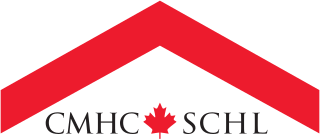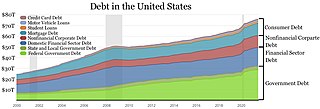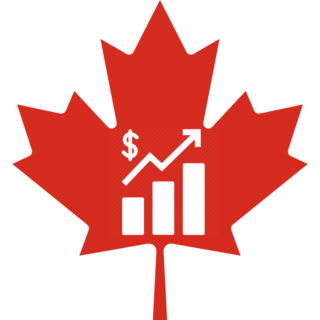A subsidy or government incentive is a type of government expenditure for individuals and households, as well as businesses with the aim of stabilizing the economy. It ensures that individuals and households are viable by having access to essential goods and services while giving businesses the opportunity to stay afloat and/or competitive. Subsidies not only promote long term economic stability but also help governments to respond to economic shocks during a recession or in response to unforeseen shocks, such as the COVID-19 pandemic.

In finance, a loan is the transfer of money by one party to another with an agreement to pay it back. The recipient, or borrower, incurs a debt and is usually required to pay interest for the use of the money.
A tax credit is a tax incentive which allows certain taxpayers to subtract the amount of the credit they have accrued from the total they owe the state. It may also be a credit granted in recognition of taxes already paid or a form of state "discount" applied in certain cases. Another way to think of a tax credit is as a rebate.

A student loan is a type of loan designed to help students pay for post-secondary education and the associated fees, such as tuition, books and supplies, and living expenses. It may differ from other types of loans in the fact that the interest rate may be substantially lower and the repayment schedule may be deferred while the student is still in school. It also differs in many countries in the strict laws regulating renegotiating and bankruptcy. This article highlights the differences of the student loan system in several major countries.

A sole proprietorship, also known as a sole tradership, individual entrepreneurship or proprietorship, is a type of enterprise owned and run by only one person and in which there is no legal distinction between the owner and the business entity. A sole trader does not necessarily work alone and may employ other people.

The KfW, which together with its subsidiaries DEG, KfW IPEX-Bank and FuB forms the KfW Bankengruppe, is a German state-owned investment and development bank, based in Frankfurt. As of 2014, it is the world's largest national development bank and as of 2018 Germany's third largest bank by balance sheet. Its name originally comes from Kreditanstalt für Wiederaufbau. It was formed in 1948 after World War II as part of the Marshall Plan.

Canada Mortgage and Housing Corporation is Canada's federal crown corporation responsible for administering the National Housing Act, with the mandate to improve housing by living conditions in the country.

The Ontario Student Assistance Program (OSAP) is a provincial financial aid program that offers grants and loans to help Ontario students pay for their post-secondary education. OSAP determines the amount of money that a student is eligible to receive by considering factors such as tuition, course load, and the financial resources of the student. More than 380,000 students – more than half of all full-time students – received student financial aid in 2014-15.
The Canadian Scientific Research and Experimental Development Tax Incentive Program provides support in the form of tax credits and/or refunds, to corporations, partnerships or individuals who conduct scientific research or experimental development in Canada.

A mortgage loan or simply mortgage, in civil law jurisdictions known also as a hypothec loan, is a loan used either by purchasers of real property to raise funds to buy real estate, or by existing property owners to raise funds for any purpose while putting a lien on the property being mortgaged. The loan is "secured" on the borrower's property through a process known as mortgage origination. This means that a legal mechanism is put into place which allows the lender to take possession and sell the secured property to pay off the loan in the event the borrower defaults on the loan or otherwise fails to abide by its terms. The word mortgage is derived from a Law French term used in Britain in the Middle Ages meaning "death pledge" and refers to the pledge ending (dying) when either the obligation is fulfilled or the property is taken through foreclosure. A mortgage can also be described as "a borrower giving consideration in the form of a collateral for a benefit (loan)".

In the United States, student loans are a form of financial aid intended to help students access higher education. In 2018, 70 percent of higher education graduates had used loans to cover some or all of their expenses. With notable exceptions, student loans must be repaid, in contrast to other forms of financial aid such as scholarships, which are not repaid, and grants, which rarely have to be repaid. Student loans may be discharged through bankruptcy, but this is difficult. Research shows that access to student loans increases credit-constrained students' degree completion, later-life earnings, and student loan repayment while having no impact on overall debt.

Social programs in Canada include all Canadian government programs designed to give assistance to citizens outside of what the market provides. The Canadian social safety net includes a broad spectrum of programs, many of which are run by the provinces and territories. Canada also has a wide range of government transfer payments to individuals, which totaled $176.6 billion in 2009—this cost only includes social programs that administer funds to individuals; programs such as medicare and public education are additional costs.
Public housing policies in Canada includes rent controls, as well as subsidized interest rates and grants. Early public housing policy in Canada consisted of public-private lending schemes which focused on expanding home ownership among the middle class. The first major housing initiative in Canada was the Dominion Housing Act of 1935, which increased the amount of credit available for mortgage loans.

The Clean Water State Revolving Fund (CWSRF) is a self-perpetuating loan assistance authority for water quality improvement projects in the United States. The fund is administered by the Environmental Protection Agency and state agencies. The CWSRF, which replaced the Clean Water Act Construction Grants program, provides loans for the construction of municipal wastewater facilities and implementation of nonpoint source pollution control and estuary protection projects. Congress established the fund in the Water Quality Act of 1987. Since inception, cumulative assistance has surpassed 153.6 billion dollars as of 2021, and is continuing to grow through interest earnings, principal repayments, and leveraging.

The United States Small Business Administration (SBA) is an independent agency of the United States government that provides support to entrepreneurs and small businesses. The mission of the Small Business Administration is "to maintain and strengthen the nation's economy by enabling the establishment and viability of small businesses and by assisting in the economic recovery of communities after disasters." The agency's activities have been summarized as the "3 Cs" of capital, contracts and counseling.
The financing of federal political entities in Canada is regulated under the Canada Elections Act. A combination of public and private funds finances the activities of these entities during and outside of elections.
Non-profit housing developers build affordable housing for individuals under-served by the private market. The non-profit housing sector is composed of community development corporations (CDC) and national and regional non-profit housing organizations whose mission is to provide for the needy, the elderly, working households, and others that the private housing market does not adequately serve. Of the total 4.6 million units in the social housing sector, non-profit developers have produced approximately 1.547 million units, or roughly one-third of the total stock. Since non-profit developers seldom have the financial resources or access to capital that for-profit entities do, they often use multiple layers of financing, usually from a variety of sources for both development and operation of these affordable housing units.

Fossil fuel subsidies are energy subsidies on fossil fuels. They may be tax breaks on consumption, such as a lower sales tax on natural gas for residential heating; or subsidies on production, such as tax breaks on exploration for oil. Or they may be free or cheap negative externalities; such as air pollution or climate change due to burning gasoline, diesel and jet fuel. Some fossil fuel subsidies are via electricity generation, such as subsidies for coal-fired power stations.
In Malaysia, federal budgets are presented annually by the Government of Malaysia to identify proposed government revenues and spending and forecast economic conditions for the upcoming year, and its fiscal policy for the forward years. The federal budget includes the government's estimates of revenue and spending and may outline new policy initiatives. Federal budgets are usually released in October, before the start of the fiscal year. All of the Malaysian states also present budgets. Since state finances are dependent on money from the federal government, these budgets are usually released after the federal one.

The Government of Canada introduced multiple temporary social security and financial aid programs in response to the economic impacts of the COVID-19 pandemic in Canada. The initial CA$82-billion aid package was announced on March 18, 2020 by Justin Trudeau.












